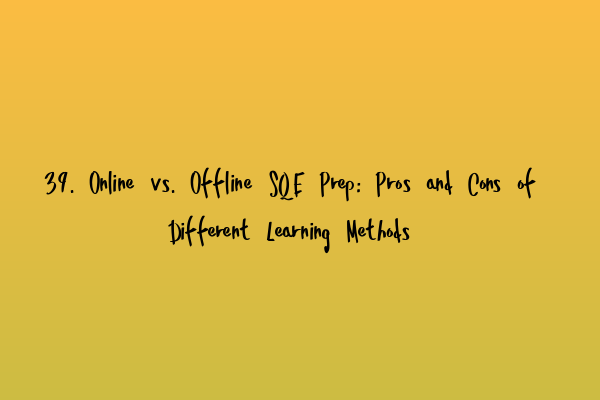39. Online vs. Offline SQE Prep: Pros and Cons of Different Learning Methods
Preparing for the SRA SQE exams is an essential step towards becoming a qualified solicitor. As you embark on this journey, one of the key decisions you must make is how you will approach your SQE preparation. Should you opt for online learning or offline learning? In this article, we will explore the pros and cons of each method to help you make an informed choice.
Online Learning
With the advancement of technology, online learning has become increasingly popular and accessible. Here are some of the advantages and disadvantages of online SQE preparation:
Pros of Online Learning
1. Flexibility: One of the significant advantages of online learning is the flexibility it offers. You can study at your own pace, choose the time that suits you best, and study from anywhere with an internet connection. This flexibility allows you to fit your studies around other commitments such as work or family.
2. Time Efficiency: Online learning eliminates the need for commuting to a physical location. As a result, you can save a considerable amount of time that would have been wasted on travel. This saved time can be utilized for more focused revision or additional practice.
3. Access to Resources: Online learning platforms usually provide a vast array of resources, including study materials, video lectures, practice quizzes, and interactive forums. This availability of resources ensures that you have a comprehensive and diverse learning experience.
4. Cost-Effectiveness: Online learning can be more cost-effective in comparison to traditional classroom-based learning. You can often find online courses at lower prices, without compromising on the quality of the materials or teaching.
Considering these advantages, it is evident why many individuals choose online learning for SQE preparation. However, there are also some potential drawbacks to consider:
Cons of Online Learning
1. Lack of Face-to-Face Interaction: Online learning can be a solitary experience as it lacks direct face-to-face interaction with tutors and peers. This may result in a sense of isolation or difficulty in seeking immediate clarification of doubts.
2. Self-Discipline and Motivation: Online learning requires self-discipline and motivation to stay on track with your studies. Without the structure of scheduled classes, some individuals may struggle to maintain a consistent study routine.
3. Technical Issues: Technology can sometimes be unpredictable, with the possibility of experiencing technical difficulties or poor internet connectivity. These issues can disrupt your studying process and potentially impact your progress.
Understanding the benefits and limitations of online learning is crucial in making an informed choice. Let’s now turn our attention to offline learning:
Offline Learning
Offline learning, also known as traditional classroom-based learning, has long been the conventional method of education. Here are the pros and cons of offline SQE preparation:
Pros of Offline Learning
1. Face-to-Face Interaction: Offline learning allows for direct interaction with tutors and peers. This personal connection can provide immediate feedback, foster group discussions, and provide a supportive learning environment.
2. Structured Learning Environment: Classroom-based learning follows a structured timetable, ensuring that you have a consistent study routine. This structure can enhance accountability and discipline in your studies.
3. Networking Opportunities: Offline learning often brings together individuals who share similar career aspirations. This creates networking opportunities, allowing you to build relationships and connections within the legal sector.
While offline learning offers these advantages, it is important to consider the potential drawbacks:
Cons of Offline Learning
1. Less Flexibility: Offline learning requires you to adhere to a set schedule, which may not be suitable for everyone. It can be challenging to balance your studies with other commitments, especially if you have a full-time job or family responsibilities.
2. Limited Access to Resources: Classroom-based learning may have limited access to study materials and resources. This might lead to a narrower learning experience, with fewer opportunities for self-paced study and revision.
3. Higher Costs: Participating in offline learning often comes with higher financial costs. Tuition fees, commuting expenses, and accommodation costs, if necessary, can all contribute to a more substantial financial investment.
Now that you have a clear understanding of the pros and cons of both online and offline learning for SQE preparation, it’s time to make a decision that aligns with your preferences and circumstances.
Fortunately, SQE 1 Practice Exam Questions and SQE 2 Preparation Courses offer a variety of online and offline learning options. Consider exploring these resources to find the most suitable learning method for your SQE journey.
In conclusion, there is no one-size-fits-all approach to SQE preparation. Both online and offline learning methods have their own advantages and disadvantages. By carefully evaluating your own learning style, preferences, and constraints, you can choose the method that best supports your SQE exam success. Good luck!
